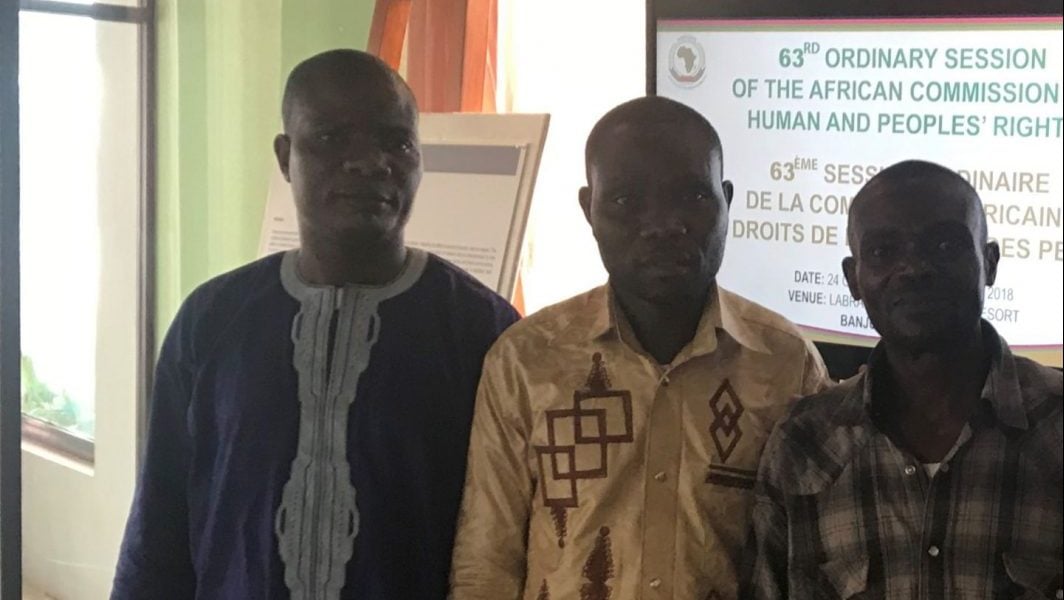
Deepening engagement: Achieving rights for Minorities and Indigenous Peoples in Africa
Duration: July 2018 – June 2021
Countries: DRC, Kenya, Rwanda, Tanzania, Uganda, Zimbabwe
Communities: Various
What was this programme about?
This programme aimed to ensure that the human rights of highly excluded and marginalized minorities and indigenous peoples (MIPs) across our target countries, are fulfilled by duty bearers and that the discrimination affecting communities like the Batwa, the Ogiek or the Maragoli is addressed. To achieve this objective, continued to strengthen and expand the skills and activism of existing and new partner organizations and grassroots community of paralegals so they can effectively challenge the human rights abuses faced by their communities through strategic litigation (building on our extremely successful track record in this field) as well as greater constructive dialogues with duty bearers.
The programme also used mentoring, training, capacity building, legal empowerment and policy advocacy. It responded to emerging threats and opportunities including Sustainable Development Goals (SDGs) monitoring, land-grabbing, declining civil space, climate change and contributed to mainstream gender and other forms of intersectional discrimination within target communities. Also, the programme was highly relevant to the SDG agenda of ‘Leave No One Behind’ as it reached out to and empowered some of the most socially and economically excluded communities in programme countries and supports their sense of entitlement to claim their rights and access services equitably. As well as Goal 10, this programme directly contributed to Goal 16 to deliver peace, justice and accountable institutions.
Why did we deliver this programme?
Ethnic and religious persecution is the foremost concern for minorities in many countries across the globe. Persecution operates on a continuum from mass killings, arbitrary detention and torture, to everyday harassment and measures, which prevent communities from peacefully following their culture, conscience or traditional ways of life. Our Maasai partners in Tanzania are one of those communities affected by such persecution. Furthermore, across the world, the work of many activists, including minority and indigenous activists, is complicated by the decline of civil space, such as in Uganda.
Poverty around the world today remains strongly correlated with minority or indigenous status. The entrenched poverty of minorities and indigenous peoples is a failure in development but it is also a direct result of discrimination and exclusion. Communities are routinely denied equal access to basic services including education, housing and healthcare, and to employment. More broadly, they are excluded from the opportunity to participate in the governance and future development of the societies in which they live. For indigenous peoples in particular, peaceful enjoyment of their land is essential both to their identity and to their development. Yet, for many, including several of the communities we worked with under this programme, such as the Ogiek, Maasai, Boni, Batwa and Benet, their rights to land are under attack.
The new Sustainable Development Goals (SDGs) and their overarching commitment to ‘leave no one behind’ clearly offer an opportunity to tackle exclusion at a systemic level. Yet, it is clear that the new development framework needs to have the concerns of minorities and indigenous peoples at its heart. Our work is certainly pushing for this, as we work with minorities and indigenous peoples to strengthen their capacities so that they can participate in decision-making processes, represent their communities and challenge exclusion. At the same time, we tackle the most significant barriers against minority and indigenous inclusion, tailoring our work to the obstacles and issues faced by the communities themselves.
What were we aiming to achieve?
- Counter religious and ethnic persecution, a root cause of forced migration;
- The inclusion of minorities and indigenous peoples in sustainable development and society.
Who were our partners?
Our partners were:
- Pastoral Women Council (PWC, Tanzania)
- Hadzabe Survival Council (HSC, Tanzania)
- African International Christian Ministry (AICM, Uganda)
- Benet Lobby Group (BLG, Uganda)
- Maragoli Community Association (MCA, Uganda)
- Ik Agenda for Development Initiative (IADI, Uganda)
- Ogiek Peoples Development Programme (OPDP, Kenya)
- Turkana Development Organizations Forum (TUDOF, Kenya)
- Awer Community Conservancy (ACC, Kenya)
- Réseau des Associations Autochtones Pygmées (RAPY, DRC)
- Foyer de Développement pour l’Autopromotion des Pygmées et Indigènes Défavorisés (FDAPID, DRC)
- Women’s Organisation for Promoting Unity (WOPU, Rwanda)
- African Initiative for Mankind Progress Organization (AIMPO, Rwanda)
- First People Disability Organization (FPDO, Rwanda)
- Basilwizi Trust (BT, Zimbabwe)
- Katswe Sistahood (KS, Zimbabwe)
- Tsoro-o-tso San Development Trust (TSDT, Zimbabwe)
Who funded this programme?
This programme was funded by the Irish Aid Civil Society Fund.
What did we learn from this programme?
This programme was continued under the name ‘Furthest Behind First‘ in October 2021, which draw upon its learnings.